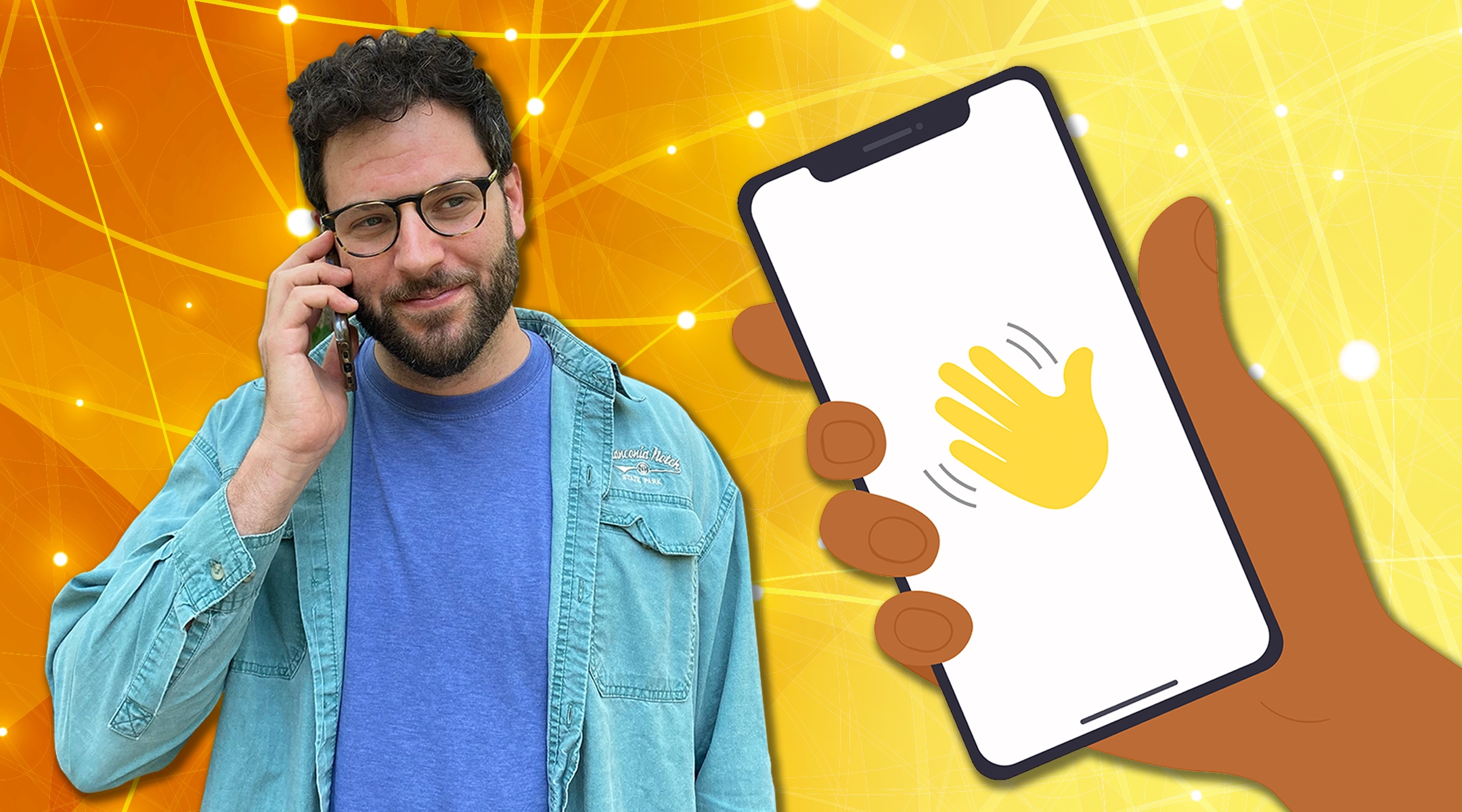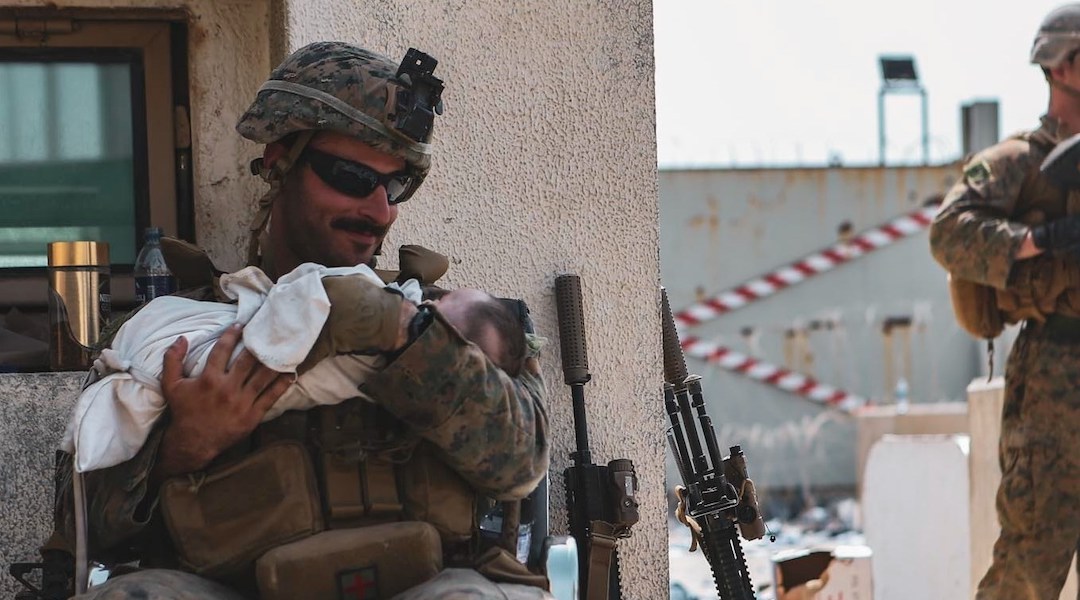How a New York Jew wound up trying to help an Afghan man he met on Clubhouse
Nat Rosenzweig said the luck that allowed his grandmother to escape the Holocaust inspired him to act after Sayed entered his chat room

Brooklyn musician and paralegal Nat Rosenzweig is working to help an Afghan man he met on the app Clubhouse move to the United States. (Collage by Mollie Suss)
(JTA) — The social networking app Clubhouse advertises its “unlikely collisions of people” — but Nat Rosenzweig, a 34-year-old Jewish musician, hardly expected it to bring him together with two Afghans hiding from the Taliban.
Yet that’s what happened after Rosenzweig signed up for the audio chat room app in early 2021. Then a year old, Clubhouse was buzzing as a tool to enable people to socialize safely during the pandemic. Rosenzweig, who grew up in a pluralistic Jewish community in Atlanta, was drawn to rooms discussing the Israeli-Palestinian conflict, where he was exposed to perspectives that were different from those in his progressive Jewish community. He made new friends there and continued the conversations into the summer.
Then, one day near the end of August, a newcomer entered a chat room where Rosenzweig was chatting with some of his new friends. He said he was calling from Kabul and the room went silent.
“Suddenly, we’re all asking him questions, asking if he’s safe,” Rosenzweig recalled to the Jewish Telegraphic Agency. The newcomer, Safi, was in his apartment beside his roommate, Sayed.
The concern was warranted. It was Aug. 30, 2021, the day the last American troops left Afghanistan. Images of Afghans hanging from a U.S. military plane as it took off from the Kabul airport had just gone viral.
Sayed and Safi, who are in their twenties and had been working for the Afghan government before it fell to the Taliban, were in hiding. (Both requested pseudonyms to protect their and their families’ safety.) A friend recommended Clubhouse so they’d have something to do. This chat room, which they’d joined at random, was the first one they’d tried.
Sayed and Safi were at work in Afghanistan’s Ministry of Finance when they heard of the Taliban’s imminent takeover.
“Our director told me that you all have to go home because the situation is getting critical and it’s not safe to stay in the office, so we left,” Sayed told JTA via Whatsapp. “Then the Taliban came and took over everything. And then everything was different. The next day we could not even go outside.”
Sayed needed to stay off the Taliban’s radar. He had done work affiliated with the U.S. military, and even before that August he’d heard of the Taliban kidnapping people with American ties outside of Kabul, killing them or blackmailing their families. Sayed had also publicly supported causes such as democracy and women’s rights. Days before Kabul fell, he was protesting in the streets against the Taliban.

As Rosenzweig heard their story, he had the impulse to help.
“Normally I might have thought to myself, what can I possibly do?” Rosenzweig said. “I’m just a random musician-slash-paralegal in New York.”
But he had just heard a story from a friend who, through several bizarre coincidences, had helped three Afghans leave the country. Rosenzweig’s friend had worked at Seeds of Peace, the social change and leadership organization that began as a summer camp where Israelis and Palestinians could meet but has broadened its scope to connect a variety of communities in conflict. Through the organization she knew an Afghan woman who was in mortal danger in Kabul. The Seeds of Peace community had found a flight for this woman, her mother and child, but the family was stuck in the throngs at the Kabul airport, unable to get through.
Rosenzweig’s friend mentioned the situation to another friend over the telephone who happened to be on a walk in Bosnia with her family friend who coincidentally knew a soldier working at the Kabul airport. The soldier ultimately was able to escort the family through the crowd onto the evacuating plane and the family made it to safety.
The story’s outrageous turns of luck affected Rosenzweig.
“I just think about all the things people have to do to get around the limitations imposed by governments unwilling to help in major ways,” he said.
Plus, Rosenzweig had grown up hearing stories about his own grandparents’ survival of the Holocaust.
“I feel deeply aware of how much grace, fortune and the kindness of strangers went into saving Jews who would have otherwise been killed. Including my ancestors.” He told them he wanted to help.
“How is he going to help us?” Sayed wondered. “But he was kind of sincere and loyal. And he truly wanted to.”
The three put their heads together. Rosenzweig found them American sponsors and a lawyer, and they worked on their applications for humanitarian parole. Sayed and Safi barely left the house, depending on friends to bring them groceries. When their money ran out in November, they apologetically asked if Rosenzweig could help with basic living expenses. Rosenzweig raised around $5,000 on GoFundMe and sent the money to Afghanistan via Western Union. But going to the local bank in Kabul was complicated.
“It was risky for us to go and withdraw money in our name because the banks were reporting on a daily basis to the Taliban,” said Sayed.
So Sayed disguised himself and traveled to Pakistan where he retrieved the money.
Still, the likelihood of getting humanitarian parole remained low.
“Humanitarian parole was never intended to be used on this scale,” explains Jeff Phaneuf, the director of advocacy at No One Left Behind, a nonprofit dedicated to helping Afghans and Iraqis who worked alongside the U.S. government receive special immigrant visas. “It wasn’t equipped to handle the influx of what’s probably over a hundred thousand applications that have come in.”
Luckily for Sayed, a student visa was another possibility: he had a B.S. in economics and a 3.8 GPA, and he’d applied for a scholarship to go to graduate school in the United States, where he’d hoped to study before returning to Afghanistan to pursue a career in public service. But the scholarship had fallen through after the Taliban takeover.
Sayed found a Youtube video on economics by a professor at the New School in New York City and applied to its masters program in global political economy. He was accepted — but their scholarship only covered 55% of his tuition and fees. It was promising nonetheless. If Sayed could raise the funds, a student visa was all but guaranteed.
Sayed told Rosenzweig the news. “He was happier than me,” Sayed said. “Like, ‘You have done all this on your own and this is a really great idea and I promise you I will make it possible.’ Then I also got more motivated.”
The two of them began a GoFundMe to raise the funds for Sayed to attend the New School this fall, which Rosenzweig circulated to friends and his Jewish community (they’ve raised about a quarter of their goal). Safi, whose English is not as strong, still hopes to receive humanitarian parole.
The story is exemplary of the ways American private citizens have advocated to help Afghans, said Phaneuf, who is former Marine Corps and who had friends on the ground at the Kabul airport last summer.
“That was the silver lining of the utter chaos and horrors starting last August was just how many Americans were willing to drop everything and make incredible efforts to aid these people with things like visas or humanitarian parole applications.”
A spokesperson for Clubhouse said of the story, “Stories like Nat and Sayed’s remind us how a simple conversation can be the start of something powerful, and even life-changing.”
It’s been close to a year since their meeting in the chat room. Sayed and Safi are still in hiding, where they do their best to keep themselves occupied, reading and watching historical movies.
Sayed recently watched “Schindler’s List,” Steven Spielberg’s Holocaust classic. The movie, he said, “shows how severely miserable our lives can get, even when we have no fault. … Taliban are in no way different than Hitler in their mentality, ego and hatred towards human species.“
Rosenzweig, who has sometimes felt in over his head, is committed to Sayed and Safi.
“It’s clear that for someone to get out of there and to a place like the U.S. safely, they either need to have lots of money or power — or they need someone to help them,” he said.
This is true of Rosenzweig’s grandmother, who was a teenager at boarding school when the Nazis invaded. Her parents’ telegrammed her to return to their Lithuanian village, but instead she hopped a train to Russia with her sister. It saved her life — everyone in her parents’ village who didn’t flee were lined up and killed. Rosenzweig’s grandmother and the other Jews on her train made their way to Uzbekistan.
“In Uzbekistan there was some random lady who hosted them for a while in her house. That’s such a huge act for a stranger to do. I couldn’t have ended up here without people who did stuff like that,” Rosenzweig said.
Rosenzweig’s upbringing made him particularly attuned to the fragility of Sayed and Safi’s situation.
“I think that Jewish values are passed down, not just through text and synagogues, but through the whole community that raises us and what they regard as important,” he said. “I think my community has real sensitivity to people’s lives hanging by a thread, and therefore to the fact that a really small act could potentially change someone’s life entirely — and such an act is often necessary to change someone’s life entirely.”
With luck, Sayed and Rosenzweig will soon meet in person in New York. Sayed said of their chance online meeting, “I don’t know if I should call it a coincidence or destiny.”
This article originally appeared on JTA.org.





















